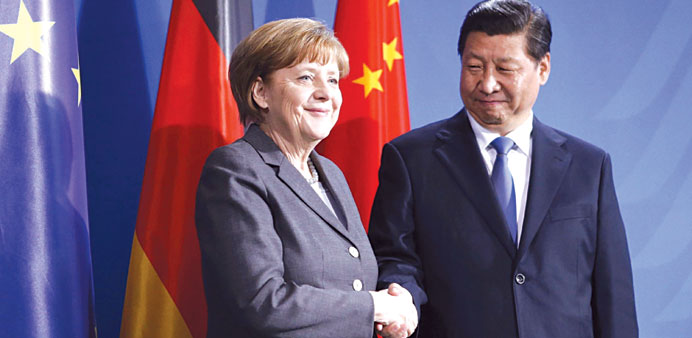German Chancellor Angela Merkel and China’s President Xi Jinping shake hands following a joint news conference after an agreement signing, at the Chancellery in Berlin yesterday.
AFP
Berlin
Export giants Germany and China pledged to deepen their strategic ties yesterday during a landmark visit by Chinese President Xi Jinping to Berlin, which also saw the inking of a raft of economic pacts.
Germany’s leading car industry took centre-stage on Xi’s third stop of a European tour, with auto giant Daimler annoucing a production deal with its Chinese partner worth onebn euros ($1.4bn).
The deal with Beijing Automotive Industry Corp (BAIC Group) would see production capacity expanded at their joint venture Beijing Benz (BBAC) by 2015.
Using a motoring metaphor, Xi said that as long as it had “a full tank” and right steering, German-Chinese co-operation had a “promising future”.
“When driving a car one mustn’t just keep the few metres ahead in view but one must also look into the distance. That’s the only way to guarantee a safe trip,” Xi told a joint press conference with Chancellor Angela Merkel.
The two leaders announced that they had agreed to work out an action plan to further step up ties, including regular consultations on regional and global political and security matters.
In a joint declaration, China and Germany also pledged closer cooperation within international bodies, such as the G20 and UN.
Germany is China’s biggest EU trading partner, while the Asian giant is a massive market for German machines, technology and cars.
With all eyes fixed on Russia’s possible next move over Ukraine, Merkel said their talks had also covered the crisis in Crimea and reiterated that Germany was “very clearly for the observance of territorial integrity... and international law”.
For his part, Xi said China sought to stay out of the internal affairs of other states and respected all nations’ integrity and sovereignty, but he called on all parties to continue to push for a political and diplomatic solution.
“We support the constructive efforts which the international community is undertaking to reduce tension,” he said.
While Xi made no reference to human rights issues, Merkel said that the topic was an “important” part of German-Chinese dialogue and stressed the importance of freedom of expression in a constantly changing world.
Xi’s visit comes the week before the largest-ever exhibition of Chinese dissident artist Ai Weiwei opens in Berlin. The outspoken artist is unable to attend as his passport was confiscated by Beijing in 2011 after a nearly three-month detention.
Accompanied by his singer wife Peng Liyuan, Xi was earlier greeted with military honours by his counterpart Joachim Gauck, a former East German rights activist, in the grounds of the presidential palace.
Outside, about 50 pro-Tibet campaigners staged a peaceful protest.
Gauck welcomed economic reforms announced by Beijing’s new leadership and urged China to continue its push towards more liberal markets and a system of justice “in which nobody is to stand above the law”.
He also indirectly addressed human rights, saying reforms could help balance different interests, including between religious communities.
“The alternative to that would be discord, conflict and violence”, he said in a speech attended by Xi.
Last year German-Chinese trade hit $161.5bn, according to the newly-established Chinese Chamber of Trade in Germany.
After a clutch of multibillion-dollar business deals were inked during Xi’s last stop in France, a raft of 18 political and economic pacts, many of them declarations of intent or preliminary accords, were signed in Berlin yesterday.

